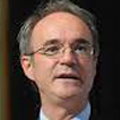Why stock prices don’t reflect all risks
(Pictured: Patrick Bolton)
Do stock prices represent a good measure of a company’s fundamental value? Not according to professor Patrick Bolton of Columbia University. A good illustration of this is the market’s complete failure to price risks associated with climate change, he says.
Professor Bolton is to address the annual Paul Woolley Centre conference at the University of Technology Sydney, October 9-10. He is one several prominent overseas speakers, including Giovanni Dell’Ariccia from the International Monetary Fund and James Vickery from the Federal Reserve Bank of New York.
Bolton argues that short-termism in financial markets is a major concern, such that very long-term risks are ignored. He says that in the absence of any systematic accounting practices to measure the benefits of ESG policies, stock prices can be a flawed measure of fundamental value.
The conference will also include a special session on the federal government’s Financial System Inquiry, which is due to make its final report the following month. This session will feature research economist professor John Quiggin and associate professor Peter Docherty of UTS Business School.
“The global financial crisis, which brought the economy to the edge of meltdown in late 2008, came as a total surprise to most of those responsible for managing the global macro-economy and financial sector,” Quiggin says. “This brought new attention to the concept of ‘Black Swans’ – or in more prosaic terms, unforeseen contingencies – such as the collapse of derivatives markets.
“How, if at all, is it possible to guard against unforeseen contingencies, given that, by definition, we do not know when or how they will arise, or what their effects will be? My argument is that regulatory systems can be made more robust by imposing limits in financial innovation. The problem, then, is to distinguish between beneficial and harmful financial innovations. This is a difficult, but not impossible task.”
Professor Ron Bird, who set up the Paul Woolley Centre in Australia and remains a director of the organisation, which is part of the UTS Business School, will present his latest research on active fund manager selection.
Professor Susan Thorp, who holds the chair of superannuation and finance at UTS, will present research which looks at why people set up self-managed super funds, what they do differently inside an SMSF and whether they are achieving their goals.
There are about 100 places for conference attendees, who are either academics or industry practitioners. To request an invitation, email: [email protected]










